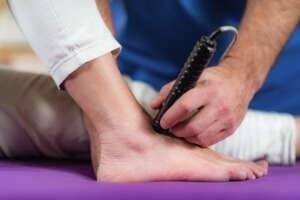Plantar fasciitis is a widespread condition that causes persistent pain and discomfort in the heel and arch of the foot. This condition arises when the plantar fascia, a thick tissue band connecting the heel bone to the toes, becomes inflamed. Contributing factors include overuse, excessive pressure, biomechanical issues, and wearing unsupportive footwear. If untreated, it can significantly affect daily life and mobility. Incorporating magnesium into your routine is an effective, natural way to alleviate plantar fasciitis pain and promote healing.

The Importance of Addressing Plantar Fasciitis
Managing plantar fasciitis promptly is critical to preventing chronic issues. While rest, supportive footwear, and avoiding strain are typical first steps, addressing underlying inflammation and supporting tissue repair requires a comprehensive approach. Magnesium is an essential component in this process, offering natural relief and aiding recovery.
The Role of Magnesium in Plantar Fasciitis
Magnesium is a vital mineral involved in over 300 biochemical processes in the body, including muscle relaxation, nerve function, tissue repair, and inflammation control. Here’s how magnesium helps combat plantar fasciitis:
1. Reducing Inflammation
Inflammation is a key factor in plantar fasciitis pain. Magnesium has potent anti-inflammatory properties that soothe affected tissues, decrease swelling, and alleviate discomfort.
2. Relaxing Muscles and Preventing Spasms
Muscle tightness and spasms in the foot or calf often worsen plantar fasciitis. Magnesium promotes muscle relaxation and helps reduce stiffness, enabling better mobility.
3. Enhancing Circulation and Promoting Healing
Improved blood circulation delivers essential nutrients to damaged tissues, accelerating repair. Magnesium supports better blood flow, aiding recovery and reducing pain.
How to Incorporate Magnesium into Your Routine
You can boost your magnesium levels in several effective ways
1. Magnesium-Rich Foods
Incorporate these foods into your diet:

- Leafy Greens: Spinach, kale, Swiss chard
- Nuts and Seeds: Almonds, pumpkin seeds, walnuts
- Legumes: Lentils, chickpeas, black beans
- Whole Grains: Quinoa, oats, brown rice
- Dark Chocolate: A satisfying magnesium-packed treat
2. Magnesium Supplements
Supplements like magnesium citrate or glycinate are effective if your diet falls short. These options are easily absorbed and replenish magnesium levels efficiently. Always consult a healthcare provider before beginning supplementation.
3. Epsom Salt Baths
Soaking your feet in Epsom salt (magnesium sulfate) baths provides localized relief. This method reduces inflammation, relaxes muscles, and eases plantar fasciitis symptoms.
Additional Benefits of Magnesium for Foot Health
Magnesium provides a range of benefits beyond plantar fasciitis relief:
- Prevents Muscle Cramps: Helps regulate calcium in muscle cells, reducing cramping.
- Improves Joint Flexibility: Reduces inflammation and supports cartilage repair, easing joint stiffness.
- Supports Nerve Function: Promotes healthy nerve transmission, reducing numbness and tingling.
Why Magnesium is Essential for Recovery
Magnesium addresses the root causes of plantar fasciitis, offering comprehensive benefits. Its anti-inflammatory and muscle-relaxing properties, coupled with its role in tissue repair, make it an invaluable part of any treatment plan. Whether through diet, supplements, or topical methods, magnesium can significantly reduce pain and promote long-term foot health.
Final Thoughts
Adding magnesium to your daily routine is an easy yet effective way to combat plantar fasciitis. By combining magnesium intake with other supportive measures—like proper footwear, stretching exercises, and rest—you can proactively manage this condition and enhance your quality of life. Don’t let plantar fasciitis hold you back. Take the first step toward pain-free living by making magnesium a key part of your recovery plan.
References
- The Base Collective. “Understanding and Managing Plantar Fasciitis Pain Naturally with Magnesium Oil.” https://litemed.co.in/blogs/news/pain-management-without-pills-simple-techniques-that-work
- National Center for Biotechnology Information (NCBI). “Plantar Fasciitis.” https://www.ncbi.nlm.nih.gov/books/NBK431073/


